Too many mechanical secrets at the localized level remain undiscovered. Understanding how biological components such as cells, tissues, and organs, as well as biomaterials sense and respond to biological cues to regulate numerous biological processes is key to advancing the current state of translational research and therapy development.
Pavone provides a high-throughput, reliable and easy to use solution to expand any advanced laboratory infrastructure. This automated platform generates comprehensive mechanobiology insights to advance your research. Due to pre-calibrated optical fiber sensors and pre-programmed experiments this instrument is a true time saver which can generate many powerful results through easy to obtain functional readouts. Pavone measures the local mechanical properties of cells, biomaterials, and 3D in vitro models
With the capacity to run up to 20.000+ measurements or approximately 400 experiments a day*, Pavone provides a high throughput platform that is optimized to fit into your biological workflow.
*Dependent on the complexity of the protocol. Contact us for more details on protocols and experiment designs.
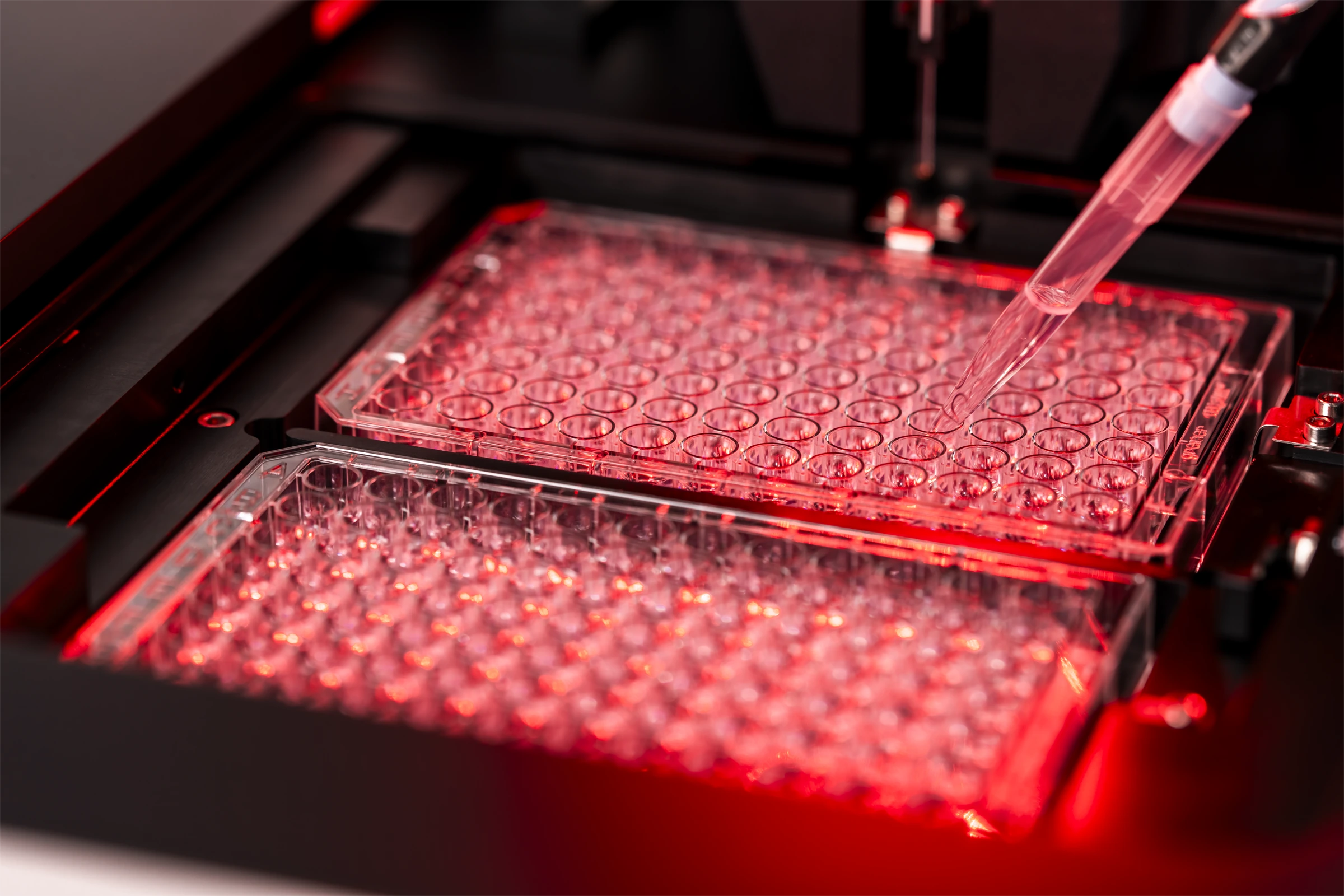
Measure soft (biological) materials in situ and under near physiological conditions, enabling repeated and non-destructive measurements on live samples over time. This allows the use of mechanics as a label-free biomarker in e.g., disease modeling, therapy development, regenerative medicine, and 3D in vitro modeling.
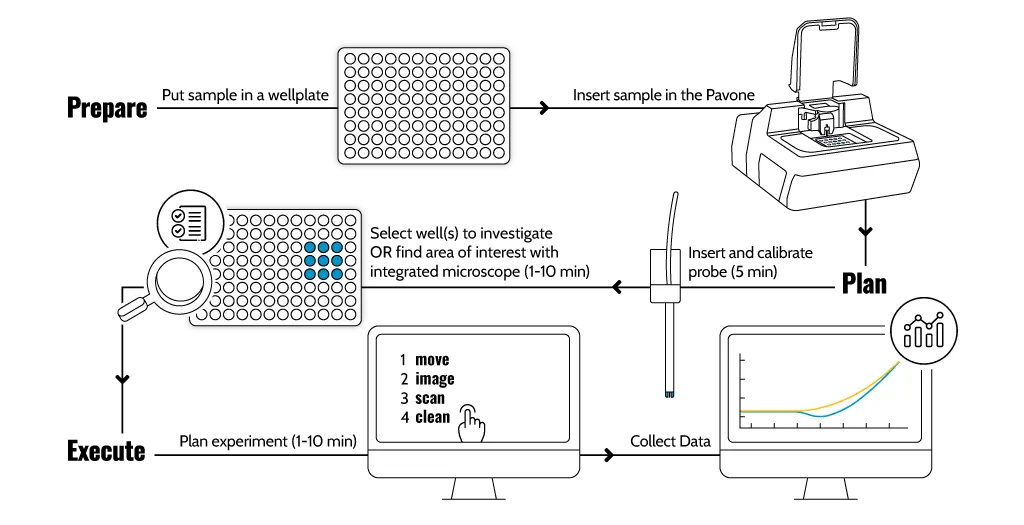
Experience adaptability within any experiment. Pavone is versatile like a Swiss pocketknife with the precision of a surgical blade; it allows high-resolution mechanical mapping from sub-cellular scale to whole tissue samples spanning up to 100cm2. This innovative approach provides researchers and scientists with a versatile and accurate tool for characterizing the mechanical properties of a wide range of biological samples. Pavone allows for automated mechanical measurements across scales and up to 5 orders of magnitude with a single probe.
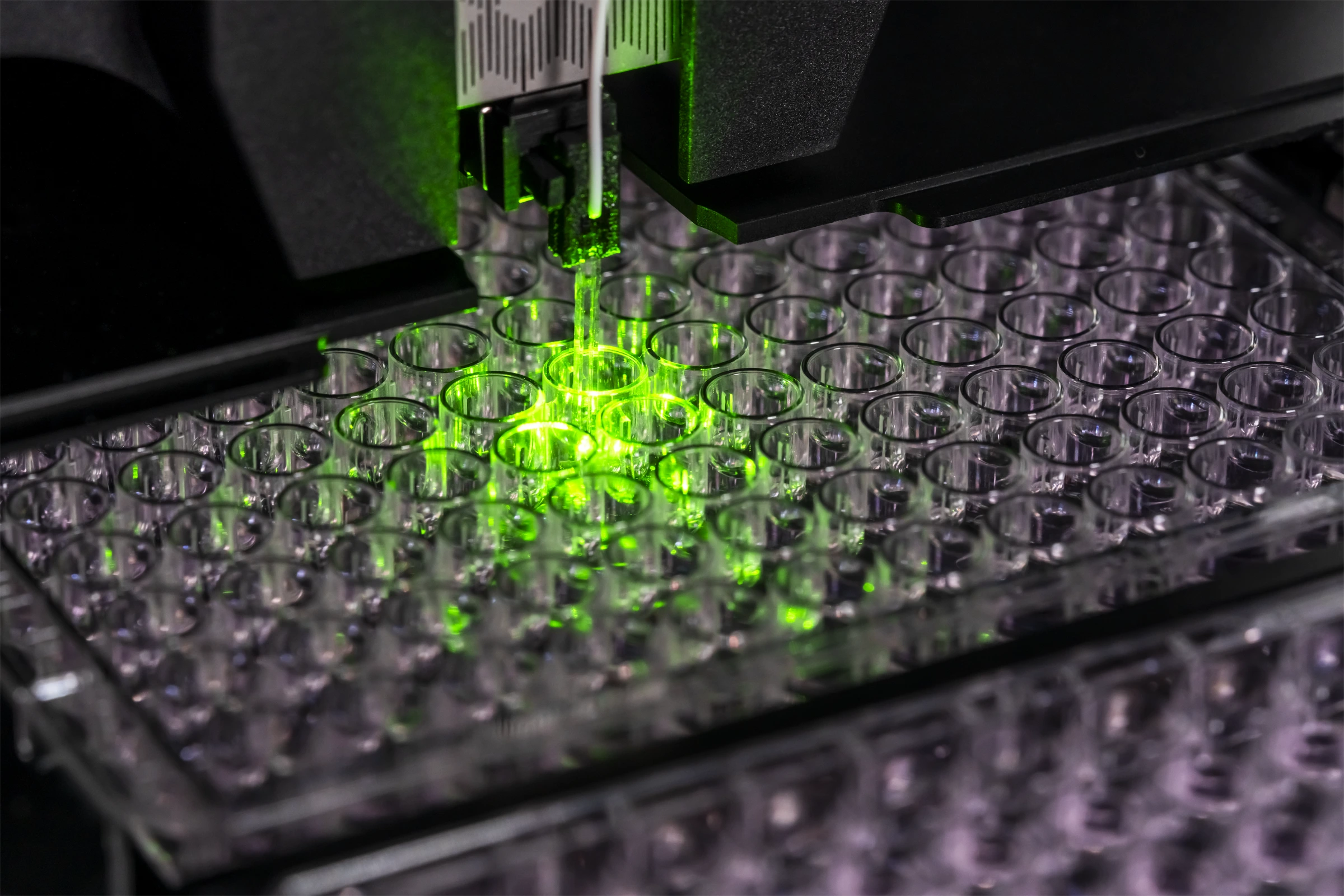
With just two days of training, an operator can start running experiments. Become an experienced user in approximately 3 weeks of regular use. Due to its innovative design and use of pre-calibrated probes, minimal operator involvement is required, providing users the freedom to program complex protocols, with automated execution. Save operation time while obtaining the results that you are looking for. As indicated by our users, it’s as easy as “I tap, I measure, I get.”
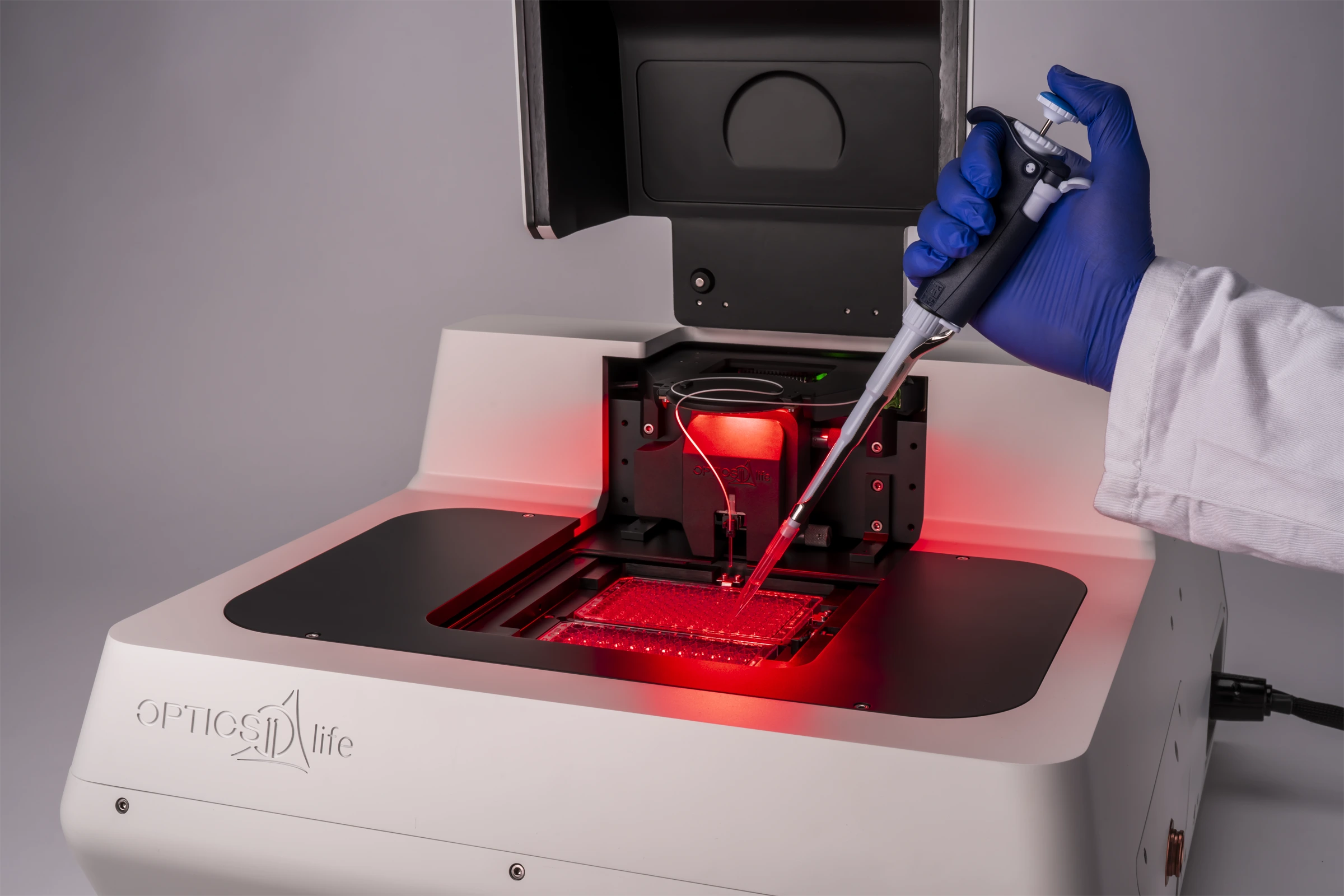
Pavone is a versatile tool for a range of applications, including the study of spheroids, organoids, hydrogels, the extracellular matrix (ECM), single cells, 2D cultures, and ex vivo tissues. It supports critical research in wound healing, in-vitro culturing, eye care, and regenerative medicine. Targeting disease areas, Pavone is pivotal in advancing our understanding of fibrosis, cancer, and neuromuscular disorders. For testing needs, it offers precise solutions in drug screening, functional assays, and degradability testing. Pavone is instrumental in mechanobiology research, equipping scientists with the ability to not only observe but to interact with the building blocks of life at a mechanical level, fostering a deeper understanding of cellular behavior and disease mechanisms.
Drug screening/toxicity
Degradability testing
Quality control
Mechanobiology research*
Pavone features an exclusive combination of automated indentation, bright-field imaging, and optional fluorescence imaging, and environmental control. Compatible with up to 2 x 96-well plates, it uniquely measures soft materials in well plates for large and extended living sample experiments. Its user-friendly workflow eliminates the need for specialized operators and extensive training, reducing equipment requirements, processing times, and costs. Importantly, Pavone measures a wide range of biological samples with high force resolution in a non-destructive manner.
Combine cell-scale / localized mechanical testing, microscopy, and environmental control in one device for synchronized operation and control. The modular design of Pavone provides the opportunity to add modules to further scale up your research capabilities, offering a future proof addition to your lab’s infrastructure.
The fluorescence module allows for the correlation of mechanical information with molecular and structural characteristics.
The environmental control module offers a variety of options for reproducing near-physiological conditions during biomaterial measurements:
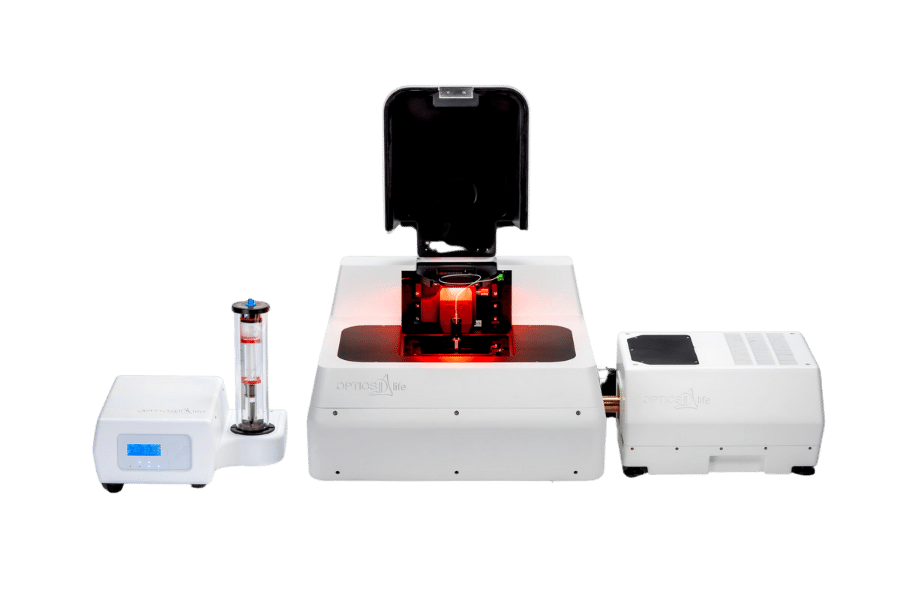
Our advanced system incorporates a feedback loop that facilitates high-precision measurements in quasi-static, stress relaxation/creep, and dynamic indentation scenarios. This feature ensures exceptional accuracy in both force sensing and indentation-depth control. This precision is crucial for accurately assessing complex mechanical properties like nonlinearity, adhesion, viscoelasticity, and poroelasticity, providing detailed insights into material behaviors.
Our system is equipped with closed-loop XY stages, offering sub-micrometer positioning accuracy across expansive ranges — more than 10 cm in each direction. This capability enables precise measurement of both small-scale features and large samples with equal ease. Complementing this, the Z stage boasts an impressive 29 mm travel range and a fine 2.5 nm encoder resolution. Paired with our diverse range of probes, it allows for adjustable contact radius between 500 nm and 50 µm. This adaptability is key for accurately conforming to samples with highly irregular surfaces, ensuring detailed and reliable measurements across a variety of sample types.

“The Pavone allows us to perform accurate mechanical measurements on spherical micrometer-sized materials, which has always been true challenge with other techniques. Moreover, the Pavone allows us to obtain spatially resolved mechanical maps of complex matter such as multi-materials or human tissues in a way that is both straightforward and easy to learn.”


“Pavone enables us to test different materials and get the data we wanted to get so far, with yields in the high-90% range. Calibration is very straightforward and much easier than traditional technologies [for mechanical characterization] . We’re able to get consistent measurements from day-to-day using the same probe. Pavone allows us to utilize mechanics in addition to transcriptional profiling to determine how the cell biology of our models compares to the cell biology within a patient.”

Whether your focus lies on mechanical measurements and characterization at the cell scale, or you work with muscle tissues, our platforms offer you precise, fast, and accurate outcomes. Discover more about how our products can help you accelerate and achieve your research goals.
With a wide range of application areas, across an array of samples, for various disease areas and testing needs, we can provide you with precise insights into mechanical cues to advance your translational research. Learn more about our applications here.
We are a growing team of 60+ passionate people, headquartered in Amsterdam, the Netherlands. Learn more about our journey so far, meet our team of professionals, and our career opportunities.
Resources
Contact